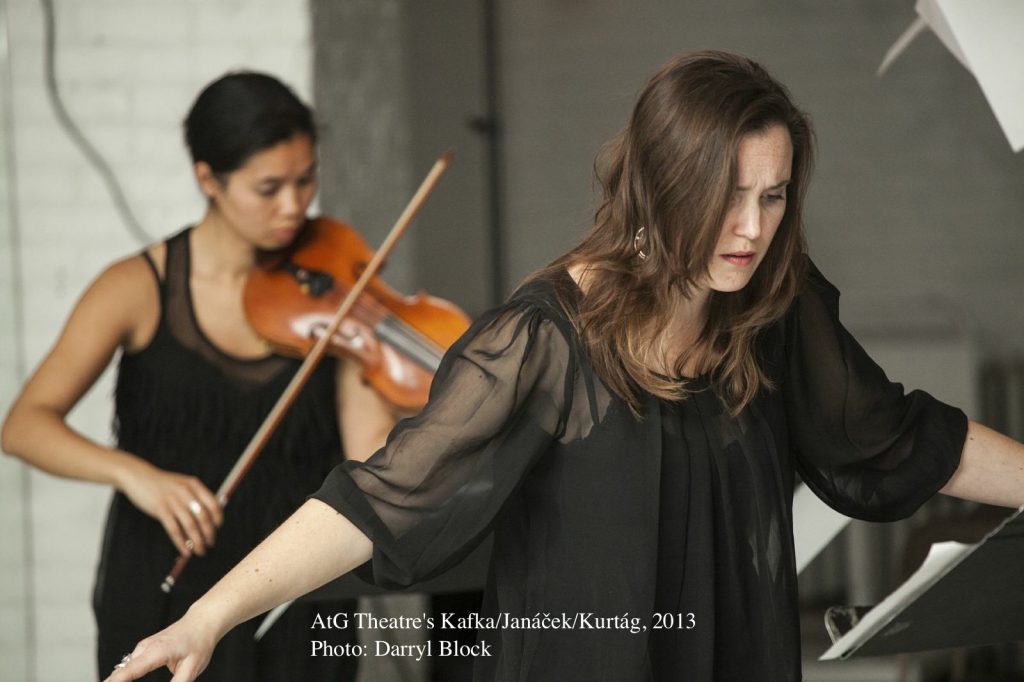The building is an anonymous two-storey brick structure in Toronto’s gritty Corktown district. Downstairs, a copy shop. Across the street, a windswept vacant lot. Upstairs, behind a red door, a commercial dance studio stretches the full length of the second floor. The space has an unexpected vibrancy, sky lit, steel-pillared, mirrored along one wall. Muscular, hard-edged.
Against the Grain Theatre, Toronto’s daring indie chamber opera producer, has chosen the locale to stage its winter 2013 offering, an electrifying double bill spotlighting a pair of infrequently performed twentieth century song cycles. Both extended selections are presented in their entirety, the first, Kafka-Fragmente op. 24, by Hungarian composer György Kurtäg, the second, The Diary of One Who Disappeared, by Czech modernist Leoš Janáček.
Born in 1926, György Kurtäg was magnetically attracted to Franz Kafka’s haunting works. The Czech writer’s troubling, almost existential vision of a society descended into senseless authoritarianism powerfully affected the young musician who had fled to Paris in the wake of the Soviet-crushed 1956 Hungarian uprising. Two decades later, after returning to Budapest, Kurtäg completed his extended musical journal, Kafka Fragments, a dense atonal scrapbook of aphorisms, observations and imagery collected over many years. Spanning close to an hour in recital, the work is as musically harrowing as it is textually vivid, Kurtäg’s personal guide to existence in an age of lingering post Cold War madness.
“The true path goes by way of a rope that is suspended not high up, but rather just above the ground. Its purpose seems to be more to make one stumble than to be walked on.”
In this constantly shifting, imbalanced world, nothing is simple, particularly not Kurtäg’s acutely tactile score. Composed for solo soprano voice and violin, the music presents performers with technical challenges approaching the impossible. Varying from less than 30 seconds to almost five minutes, each of the work’s 40 song fragments comprise unique, self-contained epiphanies, some explicit, some enigmatic and unresolved.
“The onlookers freeze as the train goes past.”
Soprano Jacqueline Woodley and violinist Kerry DuWors make the journey through Kurtäg’s tortuous Kafka labyrinths with enormous skill and courage. None of us, audience and artists alike, are ever quite certain exactly where the destination lies. Or if indeed there is one. Du Wors plays with unerring accuracy, every mood captured, every nuance of sound focused and precise. Her intensity of expression is riveting, a perfect counterpoint to Woodley’s dynamic vocal instrument. Notes are traded, soprano and violin in dazzling conversation, emotions shared. Miss Woodley has a richness of style and expansiveness that engulfs the listener. Her softer plaintive moments are anguished whispers, heart-breaking yet strangely wistful.
“The flower hung dreamily on its stem. Dusk enveloped it.”
The drama of Kafka Fragments is palpable, made even more intense by AtG Theatre founder Joel Ivany’s sharply pointed, minimalist direction. Designer Michael Gianfrancesco’s suspended paper strewn cloud-like formations evoke a sky heavy with verbal implication.
More than fifty years earlier than Kurtäg, composer Leoš Janáček searched for and found a new form of operatic expression in his native Czechoslovakia. Reality-based stories and speech-inflected melodies give his work a distinctive verismo flavour. In May 1916, a series of anonymous poems appeared in a rural newspaper. The verses movingly detailed the disappearance of a runaway ploughboy who had become infatuated with a bewitching gypsy. The theme of forbidden love resonated deeply with Janáček who had found himself irresistibly attracted to a neighbour’s beautiful young wife. Almost immediately he set the mysterious texts to music. The result was The Diary of One Who Disappeared, a dark psychological rendering of sexual enchantment and guilt, more mini opera than detached songs.
“Who’s out there haunting me?
I want her turned to stone.
Throbbing head.
Molten lead
Is pouring through my burning mind.”
As Janíček, the tormented farmhand, tenor Colin Ainsworth sings with raw energy and fierce commitment. His sound is as big and boisterous as a country boy’s cry, increasingly shaded and muted as a disquieting sense of sadness settles over events. In the role of Zefka the gypsy, soprano Lauren Segal is a sultry, seductive free-spirit, high flying as “the skylarks rising there”. With her wide-ranging clear, sky blue vocal colours deliciously underlain with earthy tonal hues, Miss Segal gives a performance of compelling sensuality. Her seduction scene with Ainsworth, staged by director Ivany with unblinking directness in a suggested furrowed field, is extraordinary, simultaneously consuming and tender. Lesley Bourza, Sarah Halmarson and Eugenia Dementzis are the story’s proto-chorus, their presence boosting already supercharged passions to their extreme. AtG music director Christopher Mokrzewski provides inspired piano accompaniment throughout, nimbly tracing Janáček’s tumultuous score with superbly intense, emotionally driven playing.
Kafka/Kurtäg Janáček is the latest in a string of hits presented by AtG Theatre in a variety of offbeat venues. Puccini’s La Bohème was staged in a bar. Britten’s Turn of the Screw in a former Victorian mansion. Spring 2013 brings the company’s take on The Marriage of Figaro with an original libretto set in a real life wedding reception hall. Opera is, has been and always will be powered by passion and imagination. Against the Grain Theatre has the essential ingredients in abundance. With their latest production, this visionary little company continues to redefine the look and sound of performance in Toronto.


